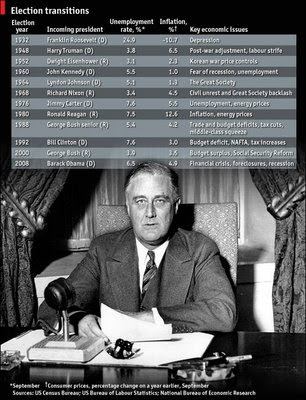 This opinion graphic appeared in The Economist on Friday, comparing the situations inherited by presidents from Roosevelt to Bush. Roosevelt's election in the benchmark year 1932, after the Great Depression had moved through the country for years, starting soon after the stock market crash of October 1929, makes our present difficulties seem more manageable -- but perhaps that's The Economist's way of arguing that though we have problems we could recover without a major move to the left.
This opinion graphic appeared in The Economist on Friday, comparing the situations inherited by presidents from Roosevelt to Bush. Roosevelt's election in the benchmark year 1932, after the Great Depression had moved through the country for years, starting soon after the stock market crash of October 1929, makes our present difficulties seem more manageable -- but perhaps that's The Economist's way of arguing that though we have problems we could recover without a major move to the left.That debate also takes the form of an argument about whether President-elect Obama should start with large moves or small ones; it was argued in these terms by David Brooks and Paul Krugman in the New York Times on Friday, 7 November 2008. And then there's the argument urging the new president do nothing and get out of the way of the market; the case is put by Andrew Wilson in "Five Myths about the Great Depression," Wall Street Journal, 4 November 2008 (if you buy his argument I'm guessing you did not vote for Barack Obama on November 4).
These issues are presented to us as doubly rhetorical. They are rhetorical in that they are presented to us as arguments for one course or another as issues of policy. They are also rhetorical in the sense that choosing the order of the agenda and small versus large moves has not only technical but also rhetorical dimensions, since each move creates the new rhetorical situation and the climate of opinion in which the next move can be addressed.
graphic credit: AP, in The Economist, 7 November 2008.
See also
Katrina Vanden Heuvel, "The First 100 Days," The Nation blog, 7 November 2008.



















No comments:
Post a Comment